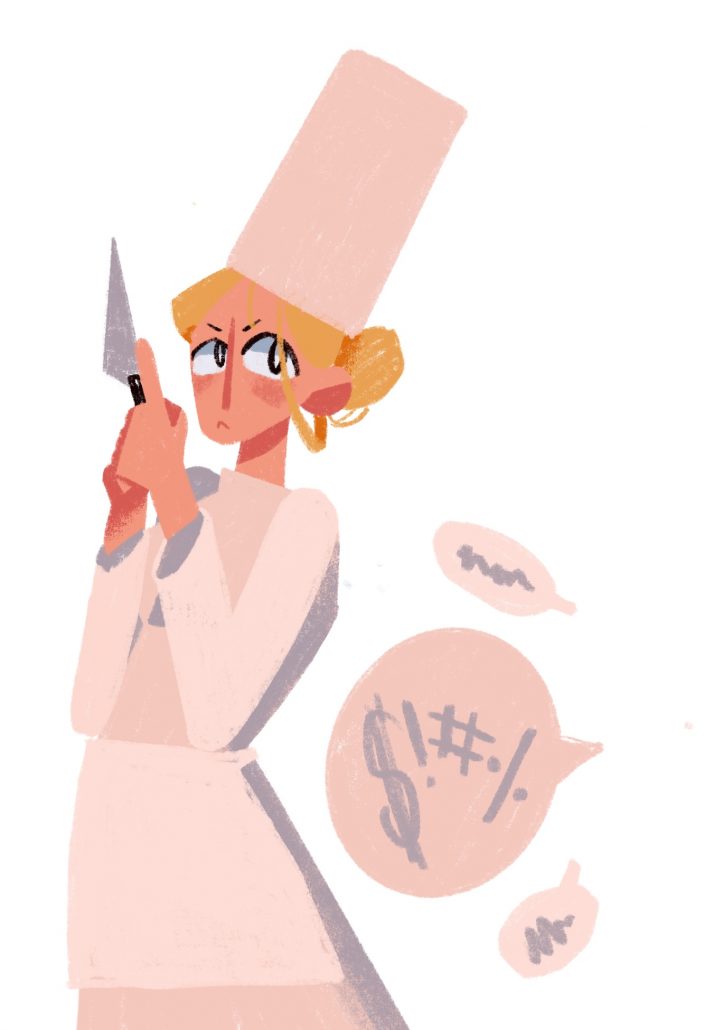Eating L.A. Before it Eats Itself: Sexism survives largely unnoticed in the restaurant business

The first food I ever learned how to cook was scrambled eggs. Standing over the kitchen stove on a chair, looking over my dad’s shoulders as he poured eggs, milk and cheese into a pan, stirring as they cooked.
Some days, I would watch as he made shapes out of store-bought pancake mix, making my own Pollockian masterpieces for breakfast. It is a simple, bright memory, one that I’m sure I share with many children raised in the U.S., and one that kick-started my eventual all-consuming passion for food.
My love for cooking lay dormant throughout most of middle school — as I transitioned from a kid who ate too much to a teen who ate too little, food was never a priority for me. Meals came in brown bags or on a plastic tray or served on the blue floral china set we kept for too many years at my house.
But, as I explored the gustatory world outside of my small, white neighborhood in high school, I began to grow obsessed with food — eating it, learning about it, making it, all of it. I watched Anthony Bourdain until I fell asleep. I read Eater and Thrillist and Bon Appétit every day, scrolling through pages and pages in between classes. On dull weekends or days at the mall, I would spend hours in the cookbook section of Barnes & Noble, reading recipes and stories of chefs and bakers.
By the time I entered college, I was determined to score a restaurant job where I could get closer to the industry I so desperately wanted to be a part of. And, after the bulk of my courses were complete, I found a job working the front of house at a restaurant.
For a while, it was everything I had hoped for — I memorized the menu, served food, talked to customers, even got to prepare a couple of dishes. But over time, I was slowly exposed to a rotten side of the restaurant industry I had skimmed over in all my reading.
When a cook first started calling me inappropriate nicknames, I ignored him. I figured this was sort of the standard, and I didn’t really mind. I had been called worse things. And none of my managers seemed to be bothered by it. When his hands grazed my back, I brushed it off — a mistake, a miscalculation on my part. Just a friendly touch.
For seven months, I ignored the way he treated me.
It was only when I discovered another coworker had been changing the background of our company computers to images of me that I finally got angry. I felt violated. I felt like I was the butt of a joke I was not a part of. My formal complaint felt like an enraged shout into the void, something that was never reflected on, another angry woman.
A month later, that coworker got a raise.
It took me months to work up the courage to quit. I endured it all — questions about my sexuality, compliments on my body type, jokes at my expense as a woman — for some reason, I had justified it with the idea that this was commonplace for the industry.
And, unfortunately, I was right.
The restaurant world is still a dark, treacherous territory to navigate when it comes to workplace sexism. Most restaurants don’t have an established human resources department, and if they do, they are mostly committed to ensuring complaints — and lawsuits — never see the light of day. Back-of-house dynamics can sometimes feel like a fraternity, and in a male-dominated environment, women are expected not to complain about sexist or offensive behaviors.
Restaurants seem to be at the tail end of a sweeping feminist movement, but there has been some progress. Sexual harassment accusations are being taken seriously — even big-name chefs such as Mario Batali, Mike Isabella and John Besh have faced public consequences as a result of their direct actions or cultivated environments. In 2017, the pilot season of “The Great American Baking Show,” a spin-off of “The Great British Baking Show,” was completely pulled from the air after judge Johnny Iuzzini faced sexual misconduct claims.
Additionally, more and more female chefs are opening restaurants, helping to eliminate the male-dominated atmosphere of the culinary world. Ideally, these female-led environments alleviate some of the toxicity present in stereotypical restaurant dynamics.
I love food, but I hated my job in the food industry. Some days I dreaded working with some of my coworkers, ones who had previously made me uncomfortable. Some days I felt helpless.
Looking back on it now, I realize that a younger me would be incredibly disappointed in my pacificity. Present-day me is disappointed in it too. All the passion, all the information, all the skill I had with food was wasted because I was too afraid to be upset, to be angry, to complain and be heard.
I’m never going to stop loving food. I’m never going to stop being an active member in the food industry. But now, I’m going to start respecting myself.
Christina Tiber is a senior writing about food. Her column, “Eating L.A. Before It Eats Itself,” runs every other Thursday.

